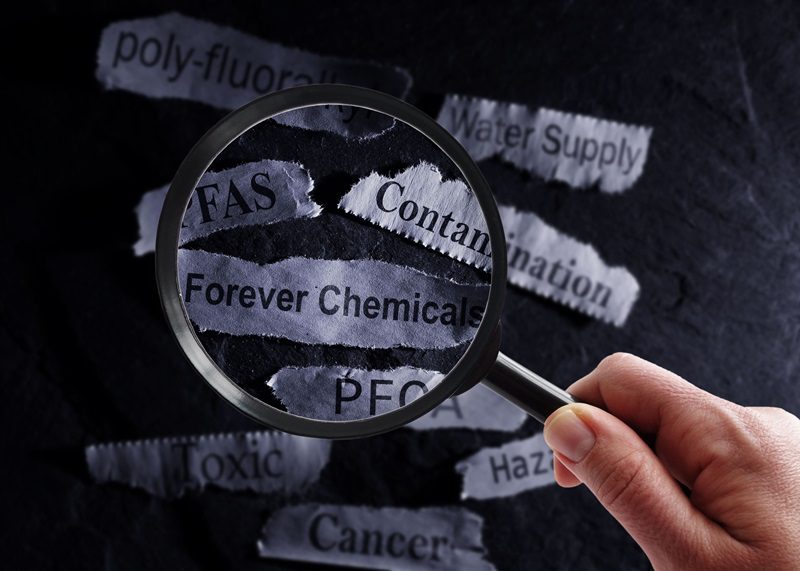How will new ‘forever chemicals’ law affect commercial clients?

Canada’s federal government is requiring businesses to report on the presence of “forever chemicals” in their supply chains by Jan. 29, 2025, a law that will have implications for commercial insurance and liability.
Per-and polyfluoroalkyl substances (PFAS), known as forever chemicals, are commonly found in consumer products and manufacturing materials. These human-made chemicals persist in the environment and do not naturally degrade due to their strong carbon-fluorine bonds.
“There are significant concerns related to their toxicity and potential impacts,” Ontario law firm WeirFoulds LLP said in a Sept. 25 article, published Monday on Mondaq. “There is significant litigation in the U.S. and starting in Canada regarding PFAS.”
The Government of Canada is requiring businesses to report on the presence of PFAS in their supply chains by Jan. 29, 2025. Environment and Climate Change Canada (ECCC) published the Canada Gazette notice, pursuant to s. 71(1)(b) of the Canadian Environmental Protection Act (CEPA) on July 27, 2024.
“The short timeframe for reporting is already causing concerns in industry,” wrote WeirFoulds partner Janet Bobechko and student-at-law Mallory Cramp-Waldinsperger in the article, New Mandatory PFAS “Forever Chemical” Reporting in Canada: What Businesses Need to Know.
“While the purpose of the Notice is to collect information respecting certain PFAS chemicals in products or manufactured items in Canada [and] establish data on the commercial use of PFAS, it is clear that the data collection will result in further regulation of PFAS and increased liability for those entities that have PFAS in their supply chain and products.”
D&O implications
In particular, directors and officers have a positive duty under CEPA to ensure companies are in compliance with the act. “They also face personal liability under CEPA where they directed, authorized or acquiesced or participated in the commission of the offence, i.e.: if a director or office knew about the reporting requirement in the Notice and took no action to ensure compliance,” Bobechko and Cramp-Waldinsperger write. “It is important that directors and officers ensure that they take all personal due diligence in relation to the Notice.”
ECCC and Health Canada published an updated draft report on the state of PFAS in July. The updated draft proposes to conclude that PFAS may be classified as a “toxic substance” under CEPA.
The notice sets out a schedule of 312 chemicals that businesses are expected to report on through a broad range of industries. For example, PFAS products can include everything from non-stick cookware, single-serve food packaging material, baby bottles, conveyer belts and trays to footwear and safety apparel. PFAS are also a major component in firefighting foam, which is effective in quashing grease and oil fires.
Reporting requirements are outlined in the notice and include, among others:
The total quantity of substances manufactured, imported and used
Application codes, substance codes and common names of goods
Technical data such as the structural formula, molecular weight distribution, and expected conditions resulting in the degradation, depolymerization or decomposition of the polymer.
“Importantly, reporting entities are required to provide the titles of any available data, studies or information related to the substance that have not already been disclosed to the Government of Canada under the New Substances Notification Regulations (Chemicals and Polymers) under CEPA,” the WeirFoulds article says.
However, it’s not clear from this broad wording how an entity would know what information what may have already been submitted to ECCC by others, or even what information is required. “Careful consideration will need to be taken by reporting entities to ensure that they have adequately reviewed the information they may have in relation to this disclosure requirement so they do not fall afoul of providing false or misleading information,” Bobechko and Cramp-Waldinsperger write.
“Given the persistent nature of PFAS, there is an increase in risk for any entities who have PFAS in their supply chain,” the article says. “The disclosure requirements in the Notice are significant and can have potential legal implications for reporting entities, including confidentiality requirements and future regulatory requirements.
Record and document
“Recording and documenting the level of effort undertaken by entities to fulfil the Notice requirements will be an important component of due diligence for both the entity as well as directors and officers,” write Bobechko and Cramp-Waldinsperger, adding they expect numerous requests for extensions on reporting deadlines.
PFAS have been the subject of a rising number of number of lawsuits in the U.S. and the industry can expect litigation to seep into Canada, an industry professional said at last year’s RIMS Canada Conference.
More than 6,500 PFAS lawsuits have been filed in the U.S. over the last 20 years. In August 2023, manufacturer 3M reportedly reached a $10.3-billion settlement from its public water system contamination suit in the U.S.
In Canada, the National Research Council of Canada was sued by Ontario homeowners who allege the NRC’s local fire research lab polluted their drinking water and devalued their homes.
In an employment-related case, a firefighter successfully proved his exposure to PFAS in firefighting foam led to the development of his testicular cancer.
“These two [cases] set precedents, certainly, to suggest that there is an avenue in Canada for pursuing litigation as it relates to PFAS,” Johanne Desloges, head of commercial and surety claims at Aviva Canada, said at last year’s RIMS Canada Conference. “It’s not going to happen overnight — we typically tend to wait and see what happens in the U.S. before it emigrates here to Canada — but it will come.”
Feature image by iStock.com/zimmytws



